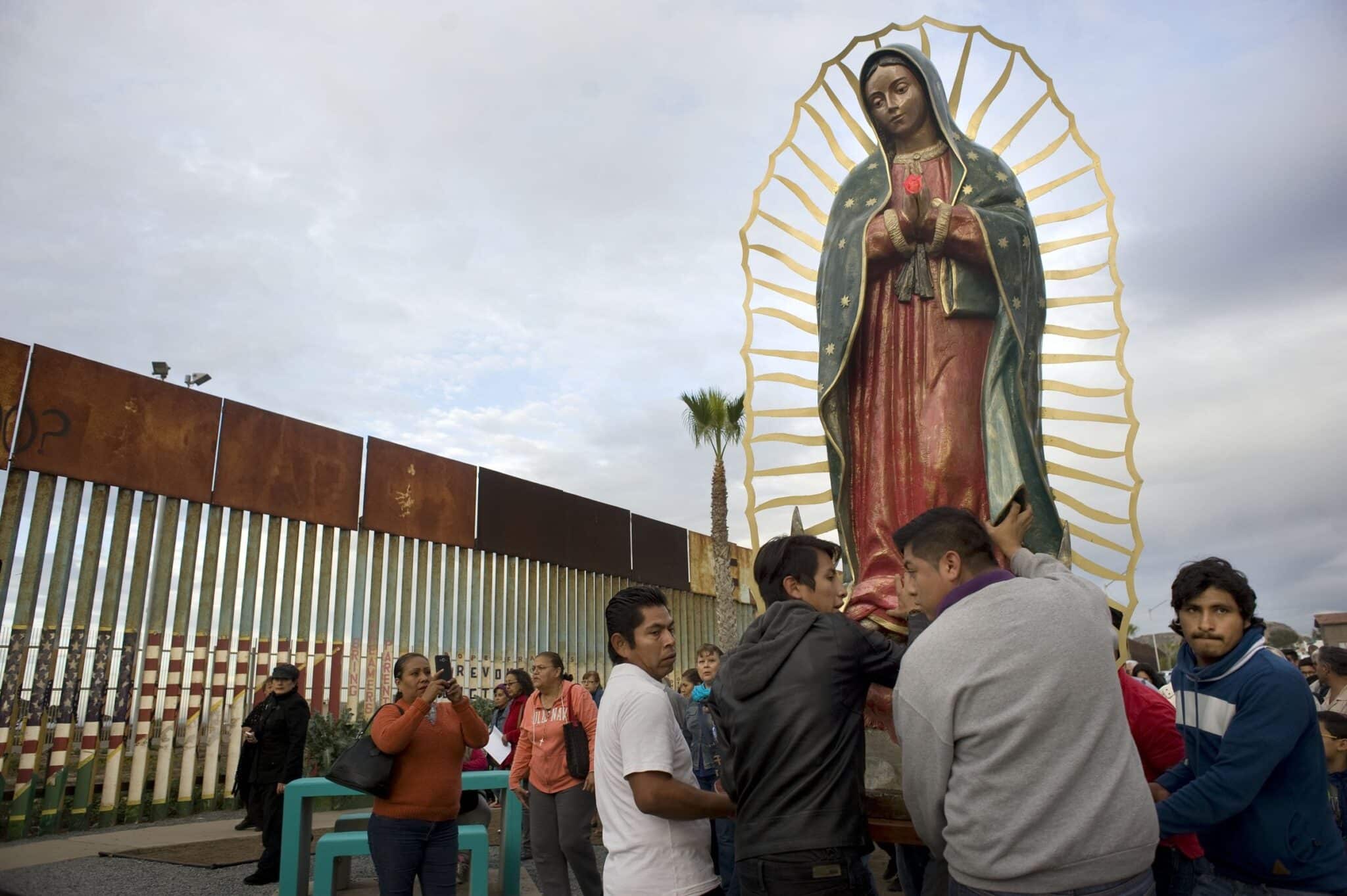I recently received a touching email from a woman who described the moment her dear husband died. “As he took his last breath, he reached his hand out as if trying to touch someone,” she wrote. “And in my heart, I believe he was being met by our daughter and his mom and dad.” I thanked her for sharing that sacred moment with me—a moment she will never forget.
As a Franciscan priest for 65 years, I have been blessed with the opportunity to preside at close to 700 funerals. Early on in my priesthood, I realized that the funeral homily is the most important one that I preach. It is more important than homilies for major feast days such as Christmas. I’ve never seen anyone in the congregation drift off to sleep during a funeral homily for one simple reason: those gathered are reliving in their minds and hearts the deaths of their own loved ones and “filling in the blanks.” They come with many questions and even fears.
Death is far more than a theological topic for discussion. It is perhaps the deepest human experience we will have, whether the death of a loved one or our own inevitable passing. Lent is the perfect time to take stock in our lives: where they have been, where they are going, and how it will end.
The Moment of Death
The reality of death may make us uncomfortable, even in our society where images of death are put before us so bluntly on TV newscasts. In fact, some people struggle to write their last will and testament for the simple reason that they have to imagine they are dead. That’s too much for them to handle. Yet the penalty for not facing up to that task gives the civil state and the court the right to determine our rightful survivors and what they should receive.
For most of us, death is a mystery. But I have found mystery is not “that about which we know nothing.” Rather, mystery is best defined as “that about which we just don’t know everything.” Death, mysterious though it may be, is such an important event in our lives and those of our loved ones that it is essential to understand as much as we can about what happens at the moment of death. A lack of understanding can only cause fear and unnecessary worry.
One common misperception is that death is something dreadful that takes life away. Death is neither something nor someone that acts upon us. It is, rather, the moment when we transition from our life in earth time into timeless eternity. When we die, we gather all of our life’s moments as we give ourselves to our Creator. It may sound poetic, but in reality it is we who embrace the transitional moment of death—rather than it taking us.
Jesus shows us that death is not something that just happens to us, but the last choice we make in our life’s journey. We remember Jesus’ final words as he breathed his last on the cross: “Father, into your hands I commend my spirit” (Lk 23:46).
God’s revealed word in Scripture helps us so much in understanding this last moment of our lives. Our understanding goes deeper than scientific or academic knowledge, for we see through the lens of faith.
You may recall the advice the fox gave to the little prince in Antoine de Saint-Exupéry’s marvelous fairy tale. The fox tells the prince, “And now here is my secret, a very simple secret: It is only with the heart that one can see rightly; what is essential is invisible to the eye.” People with faith can see and grasp some of life’s deepest mysteries; we see and understand with our hearts.
Scientifically speaking, death can be defined as “the cessation of one’s heartbeat together with the end of any brain activity.” Of course, that doesn’t touch the most important fact—we are body and spirit. Death touches only the physical body. The soul, being spiritual, cannot die. In other words, once God gives life, it never ends.
Even as people of faith, it is natural to have questions about what our last moments will be like.
For many years, I had the privilege of serving as pastoral care director for a large midwestern retirement center that included a nursing-care facility for 150 residents. I had the opportunity to pray with many elderly who were in the process of dying. I would often tell family members with tear-filled eyes that they were privileged to be there at the moment their loved one saw the face of God.
We know that God is with us, his children, at that moment. And Jesus assures us that death is also a time of God’s great grace. He reminded us of that with his words to Dismas, the thief on the cross, who murmured those beautiful words, “Jesus, remember me when you come into your kingdom.” And Jesus’ beautiful response: “Today you will be with me in Paradise” (Lk 23:42-43). These scenes and words of Scripture are God’s way of revealing to us humans the deepest mysteries of our existence. They convey God’s revelation not only to help us live our lives but also to help us understand those last moments of earthly life.
What If We Can’t Be There?
Many people are not able to be with their loved ones at the time of death. Some feel a deep sense of guilt for not being there. I wasn’t with my dad when, at the end of a round of golf on a beautiful Saturday in May, he suffered a massive heart attack and fell dead. Neither was I with my mom when, at around 2 a.m. in February 1985, sitting on her couch, she died from heart failure.
But I know that my dad nor mom died alone. No one dies alone. That’s not just my opinion. In one of the most dramatic moments at the Last Supper, Jesus told the disciples: “Do not let your hearts be troubled. You have faith in God; have faith also in me. In my Father’s house there are many dwelling places. If there were not, would I have told you that I am going to prepare a place for you? And if I go and prepare a place for you, I will come back again and take you to myself, so that where I am you also may be. . . . You know the way” (Jn 14:1-4).
Thomas said, “Master, we do not know where you are going; how can we know the way?” And Jesus replied, “I am the way and the truth and the life. No one comes to the Father except through me” (Jn 14:5-6).
Did you catch the words Jesus spoke? “I will take you to myself, so that where I am you also may be.” What a marvelous image! One of the most common human expressions of closeness is a simple hug—our arms are wrapped around another and that person’s arms around us. A hug expresses a closeness whether we are sharing a moment of happiness or sadness, saying, “I’m with you in a special way this moment.” Jesus uses this image to assure his fearful disciples and all of us. At the moment of death, Jesus comes, puts his arms around us, and says, “Time to come home.”
This is not based on wishful thinking. These are Jesus’ own words.
On one occasion, I witnessed a perfect example of that. As chaplain at the nursing home where I served, I was with an elderly lady named Florence who was in the last stages of dying from congestive heart failure. Members of her family were also present. I stood next to her bed praying the Church’s beautiful prayers for those nearing death. As I prayed, the director of nursing, Carolyn, came into the room and sat on the edge of the bed.
With a face filled with compassion, she bent down and softly slipped her arms around Florence, lifting her a bit off the bed. As she did that, she said quietly, “Florence, I’m here for you.” It was the gentlest of hugs. And as I witnessed this, I thought to myself, That’s exactly what Jesus was talking about. In the person of Carolyn, Jesus was putting his arms around Florence, just as he said he would do, and telling this frail lady, “Florence, time for you to come and join all your loved ones who are eagerly waiting to receive you.”
In the next moment, Florence spoke her last words: “My Jesus, mercy.” It was not a plea for God’s mercy on Florence’s part; rather it was her profound act of faith. And then a second image came to mind: that of the dying Jesus, in the person of Florence, being embraced by Carolyn. I will never forget those two images.
No one dies alone, whether a soldier on the battlefield or a poor, abandoned person in an alleyway. God would never abandon one of his children at this last moment in his or her life. Would any father forget his child?
God Holds Us Tightly
We can rest assured that we are never truly alone in the final moments of life. As I stood by Florence’s bed, the entire Church and I were praying for her and all those dying. These prayers are continuous around the globe, just as the Mass is offered without interruption. No one dies without being prayed for by the Church.
The Prayer of Commendation sounds like a send-off to a whole new wonderful life experience with God: “Go forth, faithful Christian, from this world to the next in the name of the Father, Son, and Holy Spirit. May your home be with God in heaven, and may you live in peace with Mary, the Virgin Mother of God, with Joseph and all the saints. I commend you, dear sister [brother], to almighty God.”
At any one time, faithful around the world are joining in this prayer. Imagine the Church is, in effect, writing a letter of recommendation for each dying person. In a way, it is like the Church telling God to be kind and merciful to their brother or sister—as if God needs to be reminded.
Our Church gives us these special words of prayer for the dying, “We entrust you, dear brother and sister, to almighty God who formed you from the dust of the earth.” The word entrust carries with it the image of a loving family handing their loved one over to God. It is as if the Church is saying, “Lord, here is our loved one. Are you sure you have him held tightly in your arms?” As if God could ever drop anyone! And so, even when we cannot be with our dying loved ones, the entire Church around the world is praying for them as only God’s Church can pray. Jesus assures us, “I’m there.”
As a people of faith, we are wonderfully blessed to know that Jesus experienced death. We can never complain, “If only you, Lord, could understand what life and death are like.” We would hear the Lord’s reply: “I know exactly what it is like. That’s why in both life and death I never leave your side.”








